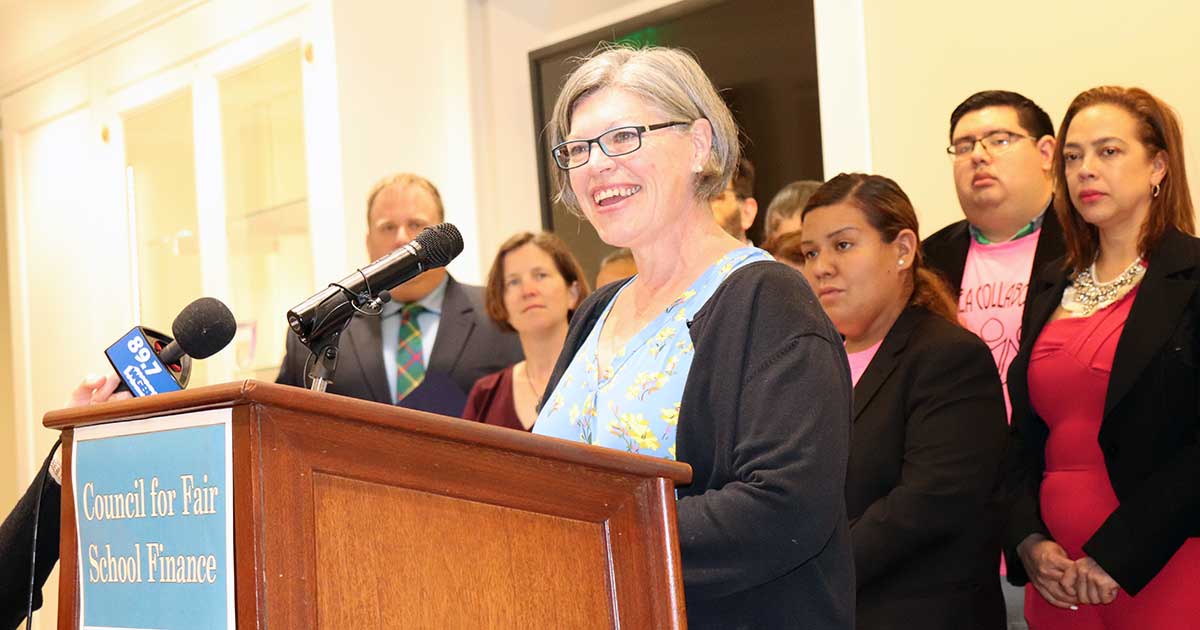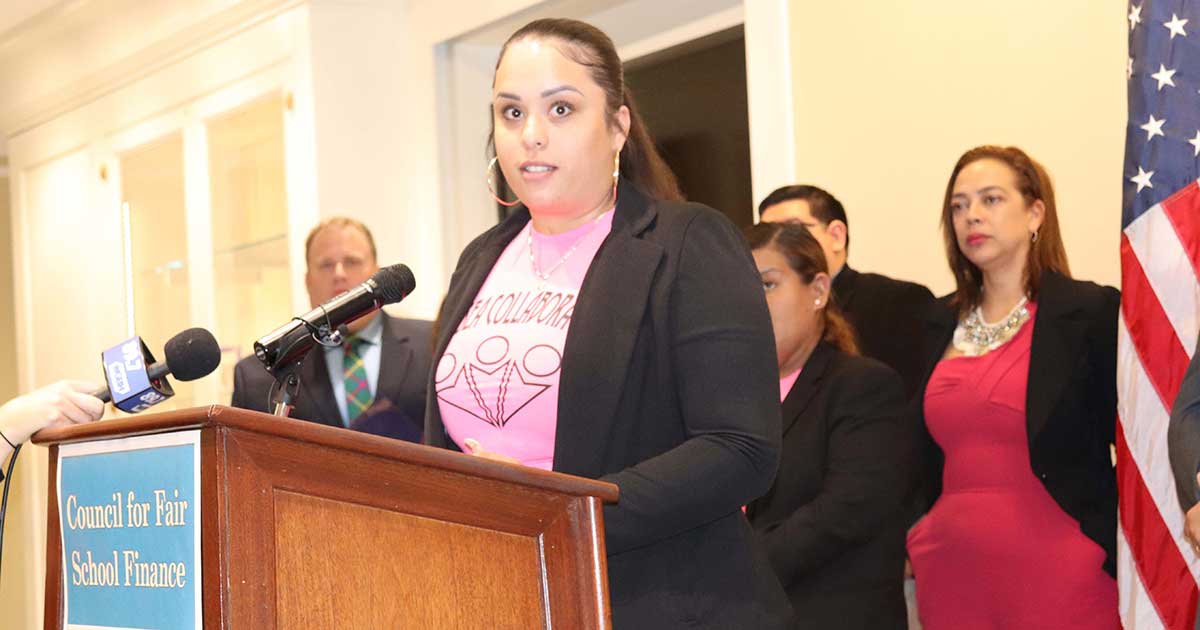MTA backs lawsuit asserting funding system hurts low-income students and students of color
MTA backs lawsuit asserting funding system hurts low-income students and students of color

Parents and local leaders speaking on behalf of a school funding lawsuit backed by the MTA and other members of the Council for Fair School Finance made a powerful case today that urban, rural and suburban districts across the state are badly underfunded, in violation of the state Constitution.
The lawsuit was filed with the Supreme Judicial Court this morning and more than a dozen parents, many accompanied by their children, took part in an emotional State House press conference in the afternoon. They stood together holding a sign stating: “Education Rights Are Civil Rights.”
“Fall River is an increasingly diverse community with growing populations of Latinx, black and foreign- born residents,” said Denise DaPonte Mussotte, a Fall River mother whose children are plaintiffs in the case. “The state’s failure to fund the staff, material and services our children need to succeed targets them for failure, instead of the success their father and I teach them to strive for.”
Mussotte, who is named as the lead plaintiff in the lawsuit, described volunteering in her school’s kindergarten class — a room with just one teacher, no assistant, and 30 students. “She doesn’t even have a chance to use the lavatory because you can’t leave 30 kids by themselves,” Mussotte said.

Maureen Colgan Posner, attending the event as president of the Springfield Education Association, said she strongly supported the lawsuit. “Any pressure we can bring to bear to get our schools fully funded is worth the effort,” she said.
As one of the state’s largest and poorest school districts, Springfield would receive tens of millions of dollars if the school funding formula was revised in accordance with the recommendations of the Foundation Budget Review Commission, a nonpartisan panel that issued a report in 2015. The Promise Act, filed to address shortcomings identified by the FBRC, is still bottled up in the Legislature’s Education Committee along with other school funding bills.
The press conference audience of parents, educators, local officials and reporters grew quiet when Danielle Andersen, a parent and School Committee member in the small Franklin County town of Orange, told her community’s story. She joked that no one knows where Orange is, so she tells them that “it’s on the route to nowhere.”
But it wasn’t always that way. Orange is located at the confluence of two rivers and once had a vibrant economy. Now there are so few good jobs that all students in town are eligible for free breakfasts and lunches.
The Orange school budget is so underfunded that the town is holding a Proposition 2½ override vote next week, though it may not pass because many local residents feel they cannot afford to pay more in property taxes, Andersen said. If it passes, the district’s one elementary school will “only” have to cut four teachers — about 10 percent of the teaching force. If it does not pass, the district will also have to lay off all of its specialists — staff who provide art, music and gym classes to students.
Enrichment is already slim. The only field trip for one class this year was a walk down the street to visit the fire station.

“My daughter is in preschool,” Andersen said, standing near 4-year-old Isabel. “I want to know she’s going to have the same opportunities as other kids. I’m also a foster parent to several children. I need to know that my school is there to support them and to help them.”
The lawsuit was developed by members of the council, a coalition of education and civil rights organizations that has a history of advancing the cause of education through the courts. The MTA is a leader in the coalition and organized the attorneys who brought the case.
Over a quarter-century ago, in the landmark 1993 McDuffy case, the Supreme Judicial Court ruled that the Commonwealth has a duty under the Massachusetts Constitution to provide students with a high-quality education.
After the McDuffy case, the Legislature created a “foundation budget” funding formula and increased resources to schools. But that formula is now out of date, leaving low-income students and children of color behind.
At the press conference, parents spoke of children not receiving the special education services to which they are entitled, of schools with leaking roofs and sweltering classrooms, and of the need for teachers to set up “Gofundme” pages to raise money for basic supplies.
Norieliz DeJesus of the Chelsea Collaborative talked about the struggle of one homeless high school student she knows who is striving to get out of poverty by taking AP and dual enrollment classes, yet sometimes has to sleep at a local laundromat.
The lawsuit contends that inadequate funding violates the Education Clause of the state Constitution, while the disparate impact that poor funding has on children of color violates the state’s Equal Rights Amendment.
“Education rights are civil rights and this complaint documents in stark detail the neglect that persists in public schools for children of color and poor students throughout this state,” said Juan Cofield, president of the New England Area Conference of the NAACP, which is also a plaintiff in the case. “Disparities between the wealthiest and the poorest districts are widening, and students in underfunded school districts are being denied the education they are constitutionally guaranteed.”
Cofield choked up when he made a plea for the Legislature to fix the problem. He ended by quoting Frederick Douglass: “It is easier to build strong children than to repair broken men,” he said.